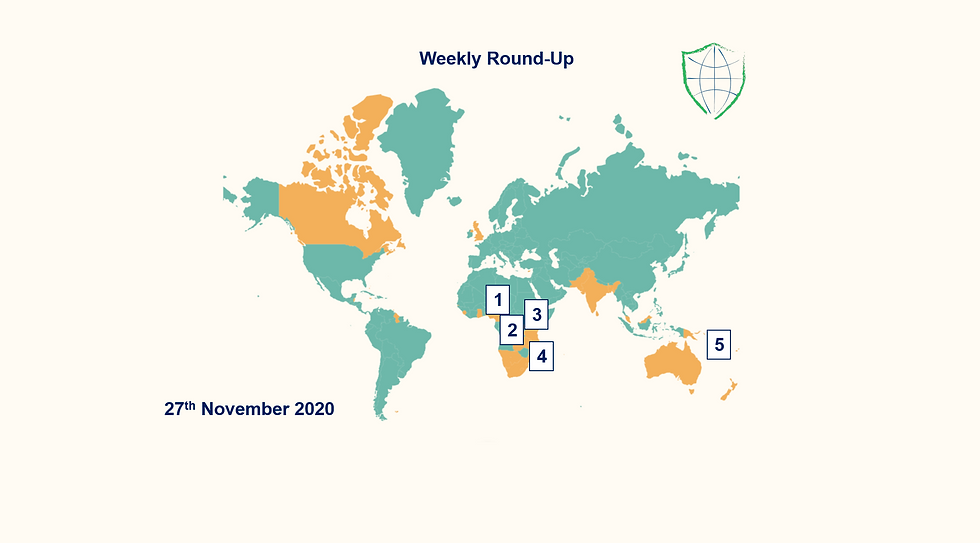Weekly Round-Up
- Commonwealth Security
- Nov 29, 2020
- 3 min read

1. Nigerian authorities arrest major cyber-crime suspects.
Three individuals have been detained by the Nigerian authorities suspected of being responsible for major cyber attacks in more than 150 countries. The group were arrested in Lagos after a successful joint operation conducted by the Nigerian police and Interpol. The accused are believed to have used mass emailing and other ‘phishing’ techniques to target public and private sector institutions, with a trail of more than 50,000 victims. Nigeria, already significantly troubled by cybercrime, has seen a spike in the phenomenon during the pandemic.
2. Report finds Sub-Saharan Africa is the new focal point for the Islamic State.
Following the military defeat of IS and the waning of conflict in Iraq and Syria, the group now appears to have shifted its “centre of gravity” to Sub-Saharan Africa, according to the 2020 Global Terror Index published by the Institute for Economics and Peace. Since 2015 the Islamic State West Africa Province has been the deadliest arm of the Islamic State, responsible for 4,188 terrorism deaths. Largely located in Nigeria, the group and its affiliates have also been responsible for many attacks in Cameroon and Chad, amongst others. The ongoing insurgency in Mozambique also has links to IS. The growth of IS in Africa is believed to be part of a deliberate ‘franchise’ strategy operated by central leadership in the Levant.
3. Fears of Desert Locust outbreak in Kenya.
Early this year there was a Desert Locust crisis in the Horn of Africa which saw the region suffer extreme food insecurity. This crisis is in resurgence as recent strong-winds have blown mature swarmlets from Somalia into North-eastern Kenya. The UN Food and Agriculture Organisation believes this will result in severe outbreaks in early December, representing a ticking time bomb for the country’s food supplies. 25 million people are suffering severe food insecurity in the region and the situation is certain to deteriorate. Whilst measures have been taken to reduce the spread of the locusts, largely the spread of growth regulators and biopesticides, it is still likely that there will be a large outbreak.
4. Mozambique and Tanzania to launch joint operations against insurgents.
The militaries of Mozambique and Tanzania are set to commence joint operations against the ongoing Islamist insurgency in Cabo Delgado province. Cabo Delgado is separated from Tanzania only by the Ruvuma river and the conflict has begun to spill over the border; in October, a Tanzanian border village was attacked by hundreds of insurgents. It is believed that many of the insurgents are themselves Tanzanian. The agreement will see the armed forces cooperate in areas such as information sharing and will involve the extradition of 516 suspected insurgents from Tanzania to Mozambique.
5. Fiji and Australia to deepen maritime security ties.
In a move to deepen defence ties and promote regional maritime security, Australia will fund the construction of a Maritime Essential Services Centre in Fiji. In a virtual meeting, Fijian Defence Minister Inia Seruiratu and his Australian counterpart Linda Reynolds discussed ways to improve regional security and agreed that this could be achieved with a new naval installation in Fiji. The centre will host the Fiji Navy headquarters, the Fiji Maritime Surveillance and Rescue Coordination Centre, Coastal Radio, and Fiji’s Navy Hydrographic Service. In a statement, Ms. Reynolds said “The new centre will greatly facilitate maritime security co-ordination within Fiji and throughout the region.”

Kommentare